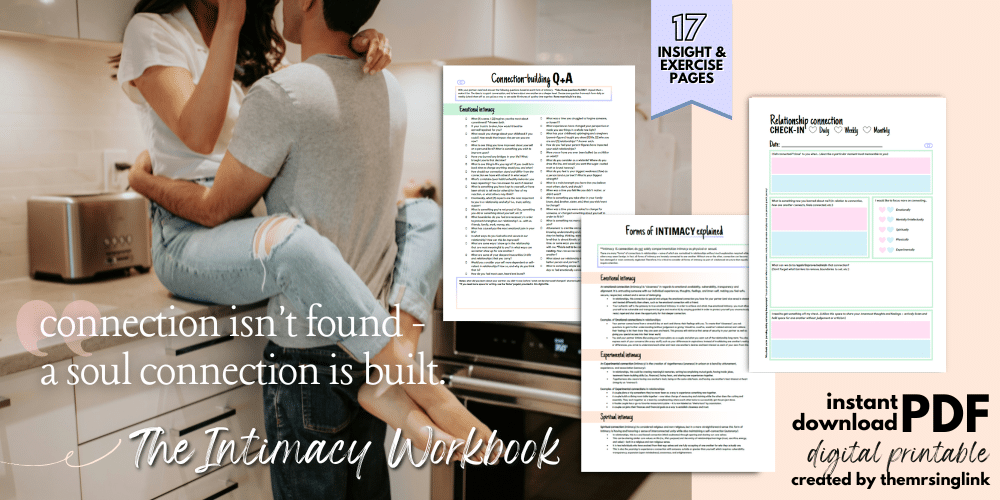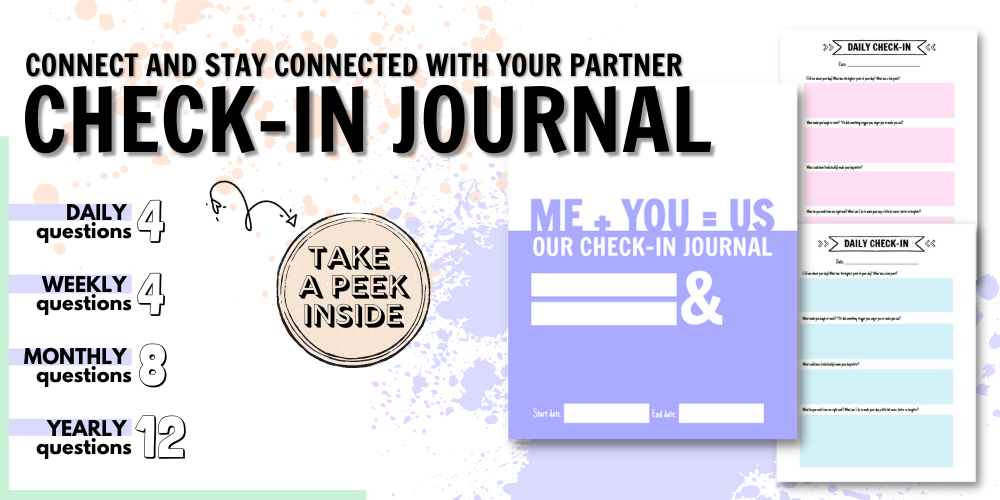It’s easy to limit ourselves when it comes to the meaning of expression. And I think it’s quite obvious that most women have an easier time demonstrating their feelings and emotions, as well as opening up emotionally to their spouse and others.
Meaning we’re [more] readily available to talk about them and willing to show them.

Most men tend to eradicate their feelings and emotions internally and/or through solution. More often you might see this as detachment, disconnection, or as an inability to open up on an emotionally vulnerable level that is more natural to you. This does not make him incapable of understanding love, or how to love. It’s simply about two very different beings with different coping strategies, different motivations to connect, and different ways of feeling Loved. With that, there’s a need to come together to better understand one another versus seeking immediate change.
That usually is the difficult part.
It’s also understanding that your vulnerability to connect and the way you desire to be loved won’t always come easy, directly or freely – let alone feel natural – to him. So if it’s his verbal expression of love or emotional openness that you crave, there are a few things I’ve learned and implemented in my marriage.
How to get him to open up emotionally [What I’ve learned]
![When He Won’t Open Up Emotionally [What I’ve Learned + Started Doing] | If you're struggling to get him to open up to emotionally, here's what you need to know - what I've learned and started doing | How to encourage your spouse to be open and emotionally connected in the relationship | #couplesgoals #marraige #relationships | theMRSingLink](https://themrsinglink.com/wp-content/uploads/2019/05/When-He-Won’t-Open-Up-Emotionally-What-I’ve-Learned-Started-Doing-pin.jpg)
Men have emotions, but they express them differently
Fact. To you, that can seem foreign. Or this looks almost invisible! The same way he can often overlook your need for attention – it can seem strange, misunderstood, and unnatural to him. When I say men express their emotions differently, I mean they internalize them rather than managing or acknowledging them through speaking.
It simply isn’t their default. *Of course, not for everyone.
From an artist’s perspective, painting for me is merely a form of expression. What I am thinking and feeling I portray visually. Some see it, many do not. That’s because others will perceive my artwork in their own unique way – so when I paint something from personal sadness, it may invoke hope to someone else.
For example, your partner’s ideal form of expression may be through a workout, playing a video game, putting in overtime at work, or engaging in a particular activity.
TBH, [hint hint!] it’s surprising how expressive and emotionally open my husband can be when he is engaging in something he loves or that we both enjoy together. Sometimes all it takes is finding that one particular thing to tickle the floodgates. Ok, not literal tears, but you know what I mean.
So if we’re talking about expression in terms of showing Love, it is not solely limited to verbal or emotional expression. It can be through affection (yes, sex, too), subtle surprises or gifts, simply spending time together doing an activity, or meaningful gestures and acts of service. Yep, him taking out the trash every Tuesday or mowing the yard every weekend because you hate doing that stuff is also his way of saying, “I Love You.“
Sure, you might read into that as responsibilities regardless if he was with you. Understood. For you, that emotional openness may be what makes you feel most loved and connected to him. But to him, being a team in the whole doing life together aspect may be what makes him feel connected to you. Just something to think about.
That being said, there two things you need to rid yourself of RIGHT NOW. 1. He can’t read your ever-changing mind. He’s not stupid – no, really – he knows your brain is a constant hamster wheel that rarely shuts down.
As a woman, the thought of my husband being that way gives me the skeevies. TBH, this has me believing more and more that women are brought up to be emotionally “difficult” – AKA passive-aggressive when it comes to our emotions, needs and wants rather than assertive (because assertive isn’t “soft” or “sexy”). So, 2. avoid the passive-aggressive stance, because it puts you in a position furthest from getting what you want.
Therefore, when I say I appreciate the fact my husband is “simple-minded” without it coming off as aloof and oblivious…I mean that I can be relieved by the fact he is fairly predictable and easy to please. *Please don’t throw stones at me!
I’m incredibly blessed to have someone that willingly and verbally expresses his love (naturally more than I do in ways), but does this mean I can expect my husband to want to undress on the quality of our marriage, and all the feels, at the drop of a dime or at the given moment I want to?
[haha] Not a chance. My husband isn’t always in the mental space to do so. It works the same way when he tries to come onto me out of the blue for, you know, and expects that I am just [*snaps fingers*] instantly in the mood. So when I’m itching for some of that lovey-dovey heart-to-heart regarding our feelings, it’s up to me to make that clear and known to him while also respecting that he may not always be in the space to do so at that moment.
With that, I have learned that my husband is not a replica of myself and how I go about expressing my emotions and love in our marriage. I also know that these differences do not make us vile, unloving, or incompatible beings and partners. Instead, we try to understand one another’s differences and do our best to accommodate those differences.
Though we aren’t perfect, by any means.
I try to encourage and support my husband to express his emotions in whichever manner is most comfortable for him, and to help create a safe [judge-free] and trusting environment in allowing him to do so… as he should also willingly do for me.
They’re not inclined to spewing every minute detail of their day… or life
When I entered middle school (from being homeschooled through elementary), my mom started this trend where I would come home from school and we would talk about my day. We would sit together on the couch, sometimes while I had a snack.
I swear there’s meaning to all of this – keep reading.
Sure, that’s seemingly harmless. I’m totally for parents being more in tune to their kid’s daily lives.
The problem for me was this became an every.single.day ritual through and into high school – like, we never missed a session – sometimes lasting hours. Eventually these talks became a disarray of things I should have done or said, what I did and didn’t do, how I could’ve done better, or what I should have done different.
This, for me alone, put a major strain on my relationship with my mother at a young age. It wasn’t long before I dreaded and resented her for these talks, feeling hopeless and inadequate as a person because of them, and I struggled with the sheer disappointment and frustration from my mom for the days when I simply didn’t feel like “talking“.
As you can imagine this taught me a few conflicting things, especially in my relationships. I was given the impression that,
- I was simply not allowed to have the choice (if I didn’t feel up to talking), and was made to feel unloving otherwise.
- If my partner wasn’t readily coming home from every long, stressful day of work to tell me about it – let alone sharing every little detail of his life with me – it meant he was emotionally closed off or worse… that he didn’t love me.
The bottom line is… that’s a terrible mindset to have.
[mailerlite_form form_id=26]He may not be inclined to dishing every minute detail of his day (let alone his life). And since when has this limitation or personal boundary become unloving? Of course, the willingness of transparency and openness in relationships IS undoubtedly healthy and beneficial, but there are two sides to the extreme. One being where he is entirely closed off, secretive, and overly private, and the other when he withdraws or shuts down emotionally because he feels suffocated by the force and violation of privacy.
If I don’t feel respected by my husband (when it comes to my limits and boundaries in mental space), this also negatively affects my trust – my ability and willingness to be open and vulnerable with him. And if that were the case, there’s a whole lot of things I would avoid telling him on a regular basis, which would also have a major impact on intimacy over time. So if my husband forces or guilts me into being open, invades or oversteps my limits and boundaries while turning the interaction onto me as an act of unlovingness, then I’m going to trust him less and resort to being closed off.
It’s a lot like shoving a square block into a circle hole.
The last thing I want to do is make someone feel like they are expected to tell me anything and everything. I want my husband to want to tell me how his day was and to care to ask about mine. I want him to want to share something stressful that happened at work or ask for my ear to vent on a matter he has been dwelling over… without my coercion, demand or intrusion.
To encourage that, I recognize his efforts to open up or share those details willingly (no matter how far and few, big or small, inconvenient or relevant to my interests or self-benefit). I also make an attempt to consider when I may be encroaching on my husband’s need for space or privacy, and if I am pushing way too many buttons all at once (so to speak).
No joke, but practicing this understanding and empathetic strategy, as well as reinforcing his trust has definitely made an impact on my husband’s willingness to open up and share that much more of his day-to-day life with me on his own.

Environment and approach is a key factor
As I’ve mentioned, sometimes I overlook the worst times to expect my husband to be fully and readily engaged emotionally. Like when he comes home after a long, stressful day of work… only to continue that work off duty, or pays greater attention to those [co-workers] he interacted with all throughout the day instead of me.
Believe-you-me, it’s super frustrating, especially when it feels like it’s a malicious-intended habit.
My inner-bitch-goddess will literally be jumping out of my skin to rip him a new one before I can even stop her. Annnd that’s when my approach ends up being far worse off than if I had kept my mouth shut, told my inner-ego to shut her trap, and let him wind down from his day the way he needs. It doesn’t mean he loves me less.
The thing is, after the fact, I usually end up relating with him. I was there once – the one with a depleting, stressful job. I would come home a grouchy zombie half the time and cringe the moment my husband would gleefully want to pry into my day, or his own, when all I wanted to do was get out of my stinky scrubs, shower and have some time to unwind (to myself).
It’s simple. There is a time and place for everything – like when an argument erupts in the middle of dinner at a crowded restaurant. If you’re the couple that insists on resolving [heated] disputes in the very environment in which it started, you are only feeding the fire.
Hashing out conflict wherever, whenever, however, might be the most obvious and convenient option (sometimes you don’t have a choice), but it won’t always have an effective or ideal resolution. This approach may work for some, but qualities like awareness, courtesy, and respect tend to be undervalued. So when you’re told to pick your battles in your relationship, that also means to consider the environment in which your battles reside.
This includes your surroundings, overall mood, and attitude as well as the presence of added stress. You might not have the best of luck getting him to open up to you in the middle of a crowded restaurant or when the kids are frantically running and screaming around the house. Your duty as a partner may be to give the very best of yourself (not what’s leftover), but your duty is also to create a safe, humble environment for when your partner inevitably fails to be their very best.
If you push, he will retract
Men just aren’t “talkers” – plain and simple. There are enough male speakers and relationship experts who will remind you of that, but they will also tell you that men DO have that emotional side. And sure, there are exceptions. As a woman, I’m actually not a huge talker myself. So I guess you could call me an exception as well.
With that, I can relate to both sides – men and women. As a blogger geared toward helping women, that statement will either benefit or bite me straight on the ass.
Moreover, I do NOT like being pushed. Or poked, prodded, coerced, pressured against my will, sadistically schooled, preached, and shunned for not acting, living, or being a certain way (or to be what is considered “normal” or acceptable among “society”) to appease a whole or others.
Frankly, no one does.
[pt_view id=”cb66511r8f”]
I’ll bet you can relate to a time in your life when someone pushed you beyond your means – making you feel isolated, powerless, wronged, and insignificant – whether it was unintentional, to motivate change, or done “out of love“. Regardless, when pushing becomes negative – manipulative, forceful, or weakening – it doesn’t encourage positive results, nor would it motivate a change.
So if you push him beyond his means, he will retract. Aggressively feeling entitled to breaking down his walls “out of love” or “for the relationship” won’t and will never have that light bulb effect.
Speaking from personal experience.
Instead, pull passively, and not on a tight rope. Listen proactively (I mean, really listen), empathize, practice patience and acceptance rather than correction, assess and control your own emotions and reactions, reaffirm and speak in a way that emphasizes and instills trust, safety, and openness without opposition.
They, too, fear REJECTION

Really let that one sink in. If that isn’t more true, then I don’t know what is. Among that is also the fear of judgment, insignificance, and weakness. As a human being, you want to be accepted for who you are – not for what someone wants you to be.
Yeah, I think that’s pretty valid.
While some of us are more willing to risk that fear, it doesn’t make the fear any less real for those who don’t. And I know I say this enough, because I’m just as guilty of this as anyone else, but we are so quick to shift our focus on the disproptionate of bad over the good. We allow one little bad thing to become monumental.
We do this unknowingly in our lives and in our relationships.
I’m not saying you should line the foundation of your relationship with mattresses and fluffy pillows, but your approach, reaction, and tone can make or break his willingness to open up and let you in emotionally. Granted everyone is entitled to their own opinion, and constructive criticism is vital when exuded in a healthy manner, but it is important to practice acceptance and releasing illogical expectations on someone who literally cannot fulfill every single one of your needs. In doing so, you encourage safe, judge-free discussions, where both sides and opinions are equally valued, and this is a crucial step in building emotional vulnerability with your partner.
Connect with me on Twitter, Instagram & Facebook so you don’t miss the latest blog updates!
![When He Won’t Open Up Emotionally [What I’ve Learned + Started Doing] | If you're struggling to get him to open up to emotionally, here's what you need to know - what I've learned and started doing | How to encourage your spouse to be open and emotionally connected in the relationship | #couplesgoals #marraige #relationships | theMRSingLink](https://themrsinglink.com/wp-content/uploads/2019/05/When-He-Won’t-Open-Up-Emotionally-What-I’ve-Learned-Started-Doing-pin-2.jpg)